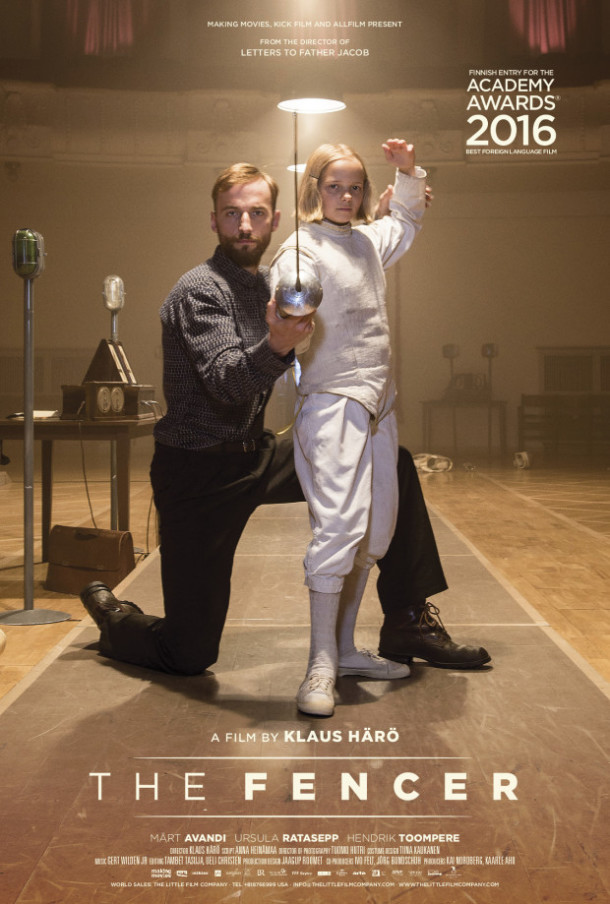 As most film fans likely know, each country can submit one film to the U.S. Academy of Motion Picture Arts and Sciences annually for consideration for Best Foreign Language Film. This year’s “foreign race” featured 81 entries, including Finland’s The Fencer, a heartfelt movie that was filmed in Estonia about a real-life teacher who made an impact on the lives of children in a small post-war Estonian village. [Update: The Fencer has now been nominated for the Best Motion Picture – Foreign Language Golden Globe!]
As most film fans likely know, each country can submit one film to the U.S. Academy of Motion Picture Arts and Sciences annually for consideration for Best Foreign Language Film. This year’s “foreign race” featured 81 entries, including Finland’s The Fencer, a heartfelt movie that was filmed in Estonia about a real-life teacher who made an impact on the lives of children in a small post-war Estonian village. [Update: The Fencer has now been nominated for the Best Motion Picture – Foreign Language Golden Globe!]
Endel Nelis (Märt Avandi) is an Estonian fencer who had been drafted during World War II by the Nazis when Germany occupied the country. When the Soviet Union conquered the country toward the end of the war, being drafted by Germany was considered a crime (never mind the fact that Endel didn’t have a choice in the matter). He has spent the last several years avoiding the Soviet secret police. In 1952 he arrives in the tiny Estonian village of Haapsalu and becomes the local school’s gym instructor. He uses this opportunity to create a fencing club for the children, most of whom are fatherless because of the War and Stalin’s ruthless regime. He also begins a romance with the school’s librarian, Kadri (Ursula Ratasepp). But as Endel’s fencing club becomes more visible, it begins to draw more attention to his pre-war background , which the school’s Principal (Hendrik Toompere) starts to investigate. When the fencing team has the opportunity to participate in a tournament in Leningrad, Endel has to decide whether or not he should save his own skin or lead his students to the tournament.
The Fencer is very “American” in the sense that the movie hits all the beats that most Hollywood historic dramas hit. Handsome lead? Romantic subplot? Overstepping authority figure with sycophant assistant? Adorable children who need a hero? All of that is here, and the plot is fairly predictable. Of course, being formulaic does not detract from the overall quality of the film, which results from polished, effective direction by director Klaus Härö. The Fencer is very well-acted, particularly by Avandi (who is best known in Estonia for being a comedic actor) and by the children. In particular, Jaan (Joonas Koff) and Marta (Lissa Koppel) are the students who make up the film’s emotional core. Both are fatherless and look to Endel for support in a village that seems to provide no future for them. All the adults (aside from Endel and Kadri, of course) appear to be impossibly old, like figures from depressing paintings. It’s easy to assume that children like Jaan and Marta would toil their years away much like their grandparents without Endel.
The film’s climax pits Marta against a much bigger and more skilled opponent in the tournament, and it serves as an appropriate metaphor for not just Endel’s struggles with the secret police but also for Estonia’s struggles against the Soviet Union in this era. It ties in with the film’s general theme of an ominous fate that Endel may face at any moment.
Finland has never won a Best Foreign Language Film Oscar, and has only once been nominated (for 2002’s The Man without a Past), though The Fencer is the fourth film by Klaus Härö to be submitted by Finland. The Fencer concludes in a heartwarming fashion, and if the movie wasn’t based on true events one would probably suspect that the ending was “sweetened” to appeal to the hearts of the voters in a Life is Beautiful fashion. In the meantime, the production company of The Fencer have launched an Indiegogo campaign to help support The Fencer reach the Oscars. The nine film shortlist will be announced on December 18, with the final five nominations announced on January 14.
At the very least, American fans of foreign film can support The Fencer by checking out one of the film’s upcoming screenings.

















Recent Comments